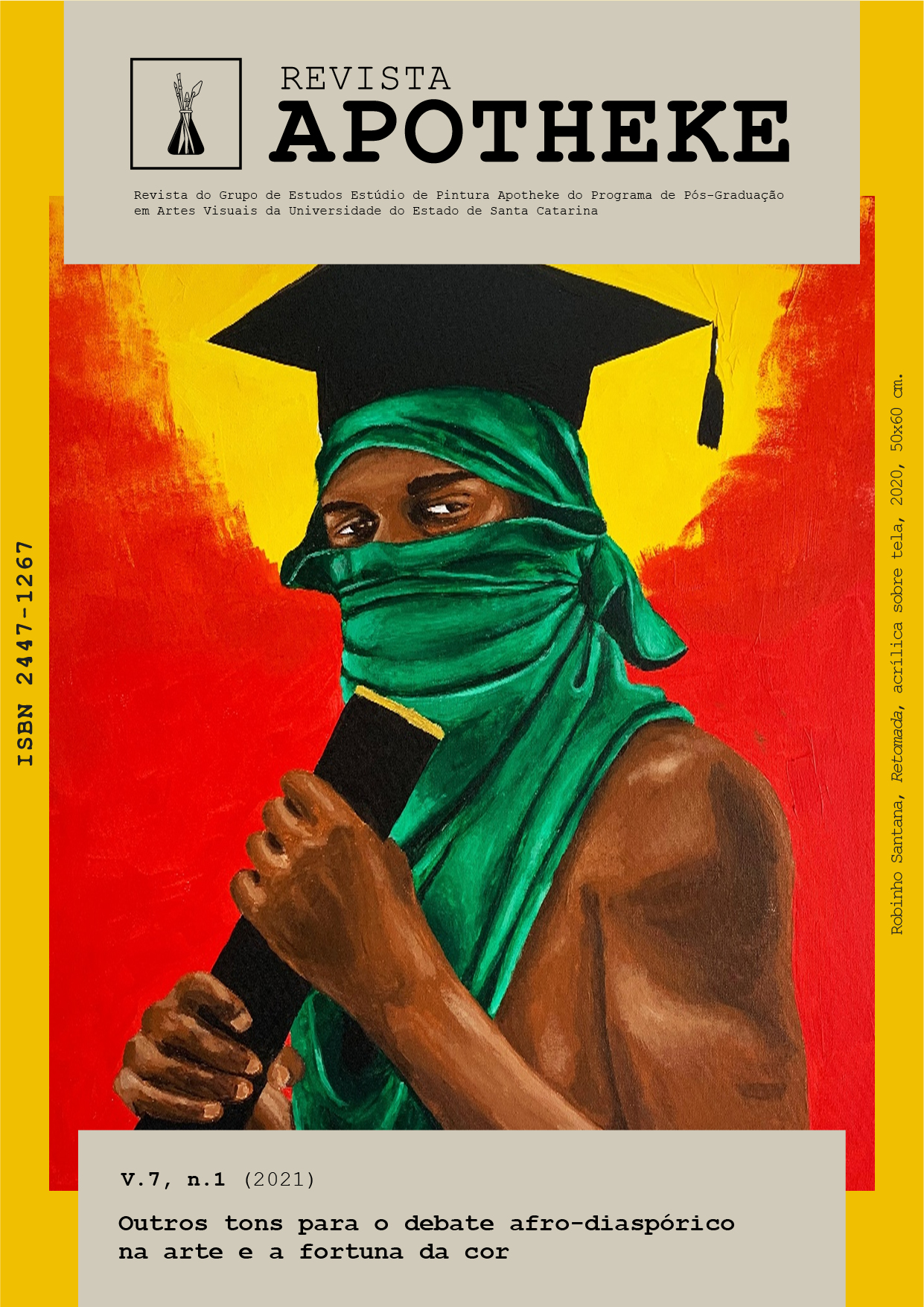Maxwell Alexandre: The colors are in the World
DOI:
https://doi.org/10.5965/24471267712021085Keywords:
Maxweel Alexandre, contemporany art , empowerment , etnico racial relations , colorAbstract
Maxwell Alexandre was born, lives, and works in Rio de Janeiro, a resident of Rocinha, one of the biggest slums of Latin America. This paper pursues the relation of Maxwell Alexandre’s paintings, from his relationship with the colors. Part of that concernment is due to one of the artist’ series called “Pardo é paper”. Maxwell presents a homonym exhibition in Lyon, Rio de Janeiro, and Porto Alegre. In a few years of production, the artist turns one of the most important references to Brazilian art and, mainly, makes part in the young Afro-descendant scene of art. Ethnic racial relations, black people empowerment, hip hop music universe, there are many possible connections between Maxwell Alexandre’s production and the recent production of the art, music, and society with the markers of race and class. The color dialogues with publicity elements and regulatory institutions, as the city police and the public school, as well as the Rio de Janeiro’s flag. In another way, the paper pursues to discuss the racial theories and the possibility of an Afro-descendant artist to deal with an element, the color, so related to a racist and excluding art system.
Downloads
References
COLLINS, Patricia. Pensamento Feminista Negro: Conhecimento, consciência e a política do empoderamento. Tradução de Jamille Pinheiro Dias. 1. ed. São Paulo. Boitempo, 2019.
DU BOIS, W. E. B. As almas do povo negro. (Tradução José Luiz Pereira da Costa). Disponível em: https://afrocentricidade.files.wordpress.com/2016/04/as-almas-do-povo-negro-w-e-b-du-bois.pdf
NASCIMENTO, Abdias. O Quilombismo: Documentos de uma Militância Pan-Africanista. 3. ed. rev. São Paulo. Editora Perspectiva. Rio de Janeiro. Ipeafro, 2019.
MUNANGA, Kabengele. Arte afro-brasileira: O que é, afinal? In: PEDROSA, Adriano; CARNEIRO, Amanda; MESQUITA, André. Histórias Afro-Atlânticas. V. 2. Antologia. São Paulo. MASP. 2018. p. 113-123.
SCHWARCZ, Lilia. Nem preto nem branco, muito pelo contrário: cor e raça na sociabilidade brasileira. São Paulo: Claro enigma, 2012.
Downloads
Published
How to Cite
Issue
Section
License
Copyright (c) 2021 Marcelo Gustavo Lima de Campos, Juliana Santos Pereira

This work is licensed under a Creative Commons Attribution-NonCommercial 4.0 International License.
Copyright and Licensing Policy
Authors of works submitted to Revista APOTHEKE authorize their publication in both print and digital formats exclusively for academic purposes. Reproduction is permitted, provided that the source is properly cited. Authors confirm the originality, authorship, and unpublished status of their manuscripts.
Articles published by the journal are freely available and intended for academic and non-commercial use only. All copyrights are transferred to the journal. The content of signed articles reflects the views of their respective authors and not the official position of Revista Apotheke. The author(s) agree to always cite the following reference when republishing or referring to the content originally published in Revista Apotheke:
“This article was originally published by Revista Apotheke in volume (insert volume), number (insert number), year (insert year), and is available at: http://www.revistas.udesc.br/index.php/APOTHEKE/index”
It is the sole responsibility of the authors to obtain written permission for the use of any material protected by copyright law included in their articles. Revista Apotheke is not responsible for copyright infringements committed by contributors.
Authors retain copyright and grant the journal the right of first publication, with the work licensed under a Creative Commons Attribution-NonCommercial License (CC BY-NC):
-
Attribution (BY): Licensees are allowed to copy, distribute, display, perform, and create derivative works, provided that proper credit is given to the author or licensor, in the manner specified.
-
NonCommercial (NC): Licensees may use the material only for non-commercial purposes.
After publication, authors retain the rights to their work and may republish the text.



